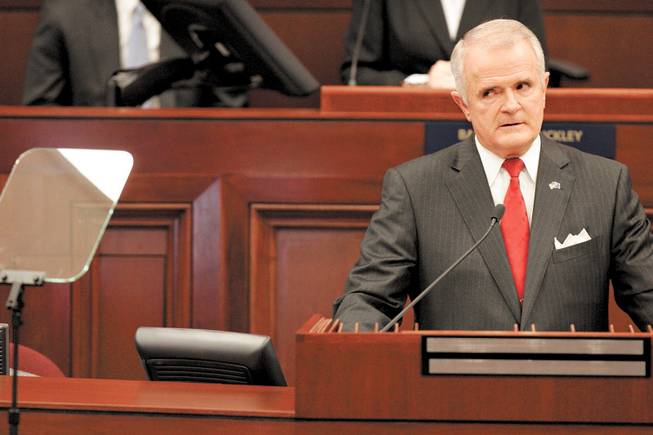
TIFFANY BROWN / LAS VEGAS SUN FILE
Gov. Jim Gibbons, who has complained about lawmakers meeting behind closed doors in the past, has himself been meeting with department heads and legislators on the state’s $900 million budget deficit and ways of dealing with the crisis.
Sunday, Jan. 31, 2010 | 2 a.m.
Sun Coverage
Sun Archives
- $4 billion in local revenue might play in state budget game (1-30-2010)
- State budget comes up $800 million short (1-22-2010)
- Forecast: Economy will begin to rebound in mid-2011 (1-22-2010)
- Gibbons’ no-talk order further divides branches (1-22-10)
- Governor candidate Brian Sandoval floats budget plan (1-13-2010)
- Special session may require help of state Supreme Court (1-10-2010)
- State budget director: Prep for another 10 percent cut (12-15-2009)
Transparency is the kissed baby of political rhetoric, an unassailable position for politicians.
President Barack Obama, state legislators, Gov. Jim Gibbons and his campaign opponents — Democrats and Republicans — all have promised to swing wide the shutters so the public can see how their tax dollars are haggled over and the future of the state and nation are shaped.
Then reality, or maybe just expediency, hits and the promises seldom translate into something the public can see.
At the start of the 2009 legislative session, Senate Majority Leader Steven Horsford, D-Las Vegas, promised a new day for the Legislature, one of openness with lawmakers doing the people’s business in public.
Indeed, public hearings on the budget were held. But when crunch time came, the doors slammed shut and lawmakers did the real debating on the other side.
Gibbons, left outside with the media, blasted the closed-door meetings.
During the presidential campaign, Obama also promised openness and transparency. C-SPAN cameras would capture health care negotiations.
When that didn’t materialize, Republicans pounced.
Gibbons sent a letter to U.S. Senate Majority Leader Harry Reid. “The issue of government transparency isn’t a partisan issue,” Gibbons wrote in the Jan. 6 missive. “I urge you to redouble your efforts to increase transparency now.”
Nevada faces a new round of budget cuts. And important decisions affecting the future of the state will soon be made.
Gibbons has met with state department heads. Legislators have met with the governor. And once again, the doors have been closed.
Despite his previous protests, Gibbons has found reasons why now is no time for transparency.
Department heads have delivered to Gibbons scenarios outlining budget cuts of 6 percent, 8 percent and 10 percent, which the governor’s office has refused to release.
Why not let the public in on the ramifications of these cuts?
Gibbons’ spokesman Dan Burns said the documents name jobs that could be eliminated and could cause anxiety for state workers.
“Transparency is good, but if one of the 10 percent budget suggestions is to close one of state’s museums, why talk about that now?” Burns said. “Why add two months of anxiety for those workers? Why not wait until there’s a decision?”
Still, when the Sun said it would accept a version with any proposed job cuts redacted, the governor’s office still declined.
Gibbons’ staff has called his recent gatherings with lawmakers “open door meetings” — that is until the media began asking why the public wasn’t allowed inside. In reality, the meetings are open to the public if you happen to be one of the public who is an assemblyman or senator.
Although the governor and legislators have had their differences, both have agreed so far not to talk about specific proposals on how to deal with the $900 million budget deficit — one of the most severe in state history.
“As soon as you add the news media, it immediately turns into Barnum & Bailey,” said Burns, a former TV news reporter for the Las Vegas Fox affiliate. “Without the news media, you can sit down — there’s no pontificating — and get right down to business.”
The public will be able to weigh in on any solutions, Burns said.
When asked when exactly that would happen, he recommended citizens call their assemblymen or senators to find out what’s happening, rather than monitoring it through the media.
John Wonderlich, policy director of the Washington-based Sunlight Foundation, a nonpartisan, nonprofit group dedicated to openness in government, said some promises of openness are never met.
Take Obama’s promise to open health care negotiations.
“That was probably naive,” Wonderlich said. “He should’ve done more to live up to the promise, but it was also a promise that was near impossible to live up to.”
The same might be true of the state budget negotiations, the wrangling and deliberation that come with governing the state. So say longtime observers and participants in state government.
Although they didn’t want to be quoted out of fear they would appear opposed to transparency, they said that to get things done it’s easiest if the public isn’t watching.
“At the end of the day,” one said, “the public elects these people to go into a room and make these decisions.”

Join the Discussion:
Check this out for a full explanation of our conversion to the LiveFyre commenting system and instructions on how to sign up for an account.
Full comments policy